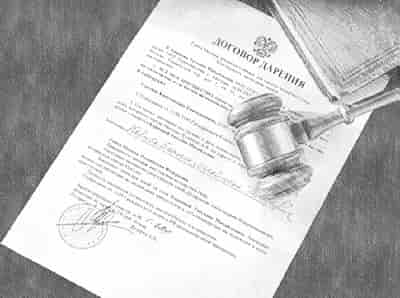Author of the article: Yulia Kaisina Last modified: January 2020 3503
During his life, a person acquires various property, including real estate: a house, a cottage, an apartment. As he gets older, he increasingly thinks about how to pass on what he has acquired to his children, grandchildren, and other close people. How can he ensure that in the event of his death, his apartment or house goes to the person he chooses? What is better: a will or a deed of gift? Each of these two methods of gratuitous transfer of real estate has its pros and cons. Let's try to compare the main differences between these serious legal documents.
Important Terms
Before moving on to the analysis of the process of preparing both documents, you need to familiarize yourself with the basic concepts:
| Gift deed | Will |
| It is a gift agreement, which is a gratuitous transfer of property belonging to the testator to a person, regardless of whether there is a relationship with them. | It is the will of the testator, in which he bequeaths his property in the event of death, indicating his heirs. |
The main differences between a will and a deed of gift
These two documents have a number of differences, which include:
- Duration of registration;
- The moment the heir receives the property;
- Cancellation or modification of an order;
- Registration costs;
- Payment of taxes;
- Possible problems.
To understand what we are talking about, it is necessary to consider each of the differences in more detail:
| Gift deed | Will | |
| Decor | To formalize a deed of gift, a package of documents is first prepared, after which the testator signs the agreement, pays a fee and registers the prepared documents. According to the law, it takes two and a half weeks for a deed of gift to be issued. | A testamentary act comes into force only after the death of the testator. The order can be obtained from a notary after six months. |
| Receiving property | According to the deed of gift, residential real estate becomes the property of the donee immediately after registration of the document, that is, the heir does not need to wait for the death of the donor, it is enough to receive the deed of gift and the apartment will become his possession. | According to the will, residential real estate can be obtained only after the death of the testator and all necessary documents have been completed. |
| Changes to the document or its cancellation | A gift means a financial transaction, the process of cancellation of which is practically impossible. The effect of the order can only be canceled through the court, by proving that the donor was incompetent at the time the document was drawn up or signed the agreement under duress. | It is much easier to challenge a will. Also, if the testator wishes, it can be changed or some additions made. |
| Cost of paperwork | When registering a deed of gift, you must pay a fee of 1000 rubles. There is no need to go to a notary office with the contract. It is drawn up in writing and then registered. | To draw up a will, you must pay for the valuation of real estate, certification of the order by a notary, interest for issuing inheritance documents and notarial management of the inheritance case before the certificate is issued. |
| Tax fees | According to the deed of gift, it will be necessary to pay 13% gift tax on the value of the inherited property. It is repaid by the donee, but only if he is not closely related to the donor. | To receive residential real estate under a will, you must pay a tax on the inheritance received, but only if it is 850 times the size of the MMORT, as well as the state fee for entering into the inheritance. |
| Problems with registration | The donor must take into account the responsibility imposed on him by the gift. Since once the contract is drawn up, it will no longer be possible to change it. For the recipient, on the contrary, such rules are the key to security. | Regardless of the wishes of the testator, a certain part of his property will go to relatives who have the legal right to inherit. |
Which is better of the two documents described above? A will is a safe transaction for the testator, since he can change the contents of the document and supplement it if he sees fit. A deed of gift, on the contrary, is beneficial for the donee, since it is extremely difficult to challenge the document.
What is the difference between a will and a deed of gift?
Will or deed of gift - this issue should be looked into in more detail so as not to regret it later.
| Basis for comparison | Gift deed | Will |
| Agreement type | Bilateral transaction (agreement). Two people express their will - the donor and the recipient. | One-sided deal. The will of the testator is sufficient. |
| Circle of alienators | Individuals, organizations | Only individuals |
| Number of alienators in one transaction | Unlimited | Limited to one person. In the Russian legal field there is no concept of “spousal will”. |
| Effective date | The day the agreement is signed by the participants or their representatives. If the subject of the agreement is subject to state registration (land, real estate), the deed of gift becomes valid after its completion. The last rule applies to notarized deeds of gift. | Comes into force upon the death of the testator. A will in emergency situations that has not been certified by a notary or other authorized means becomes valid after confirmation of its validity by the court. |
| Subject of the transaction | A thing or property right expressly specified in a contract. | May be defined in different ways: • all assets; • their ideal share; • a certain thing, property right. |
| Ownership of alienated assets | You can give what you own. | The testator may dispose of assets that he does not own, but is likely to own. If the property specified in the will does not belong to the testator at the time of death, his orders regarding it are not executed |
| Encumbrances on the subject of the transaction | Prevents alienation. The donation of mortgaged property requires the consent of the mortgagee, and the donation of collateral requires the consent of the mortgagee. | Does not affect the possibility of making a will in relation to property. However, this does not mean that the heirs will receive the assets “clean” without debts and encumbrances. Potential proceedings with the testator's creditors are simply postponed in time. |
| Prohibition of alienation of property in relation to the alienator | Prevents alienation. Domestic legislation allows a debtor to be prohibited from disposing of property even if a judicial dispute or enforcement proceedings do not directly concern this property. Example: the culprit of a fatal road accident has been asked to pay monetary compensation to relatives. To secure the claim, the court seizes the debtor's assets up to this amount. | Does not prevent the making of a will. |
| Possibility of imposing any obligations on the beneficiary | Absolutely absent, even if the costs associated with the fulfillment of such obligations are obviously incomparable with the value of the gift. The donor of real estate cannot include in the text of the agreement the following conditions: • on reserving to him the right to use all or part of the alienated real estate; • about looking after the donor's pet; • about landscaping. An exception is a donation agreement (a type of gift), under which the recipient undertakes to use the gift for socially beneficial purposes. Example: donating rehabilitation equipment to a medical institution. | Exists in two forms. 1. A testamentary refusal establishes the obligations of the heir to act in a certain way in the interests of a third party. Example: the testator leaves a house and land in the village to his son, but obliges him to purchase a car of a certain brand for his daughter. 2. Testamentary assignment - an obligation to perform a generally beneficial action at the expense of inherited assets. |
The probate process
To decide on the type of inheritance registration, you need to know about the nuances of the two procedures. The peculiarity of drawing up a will lies in the following factors presented:
| Clearly formulated will of the testator | The testator must clearly state in writing his wishes regarding the property he is transferring, so that his words are not misinterpreted by the heirs. In addition, the document must comply with all legal standards. |
| Determining the share of property due to each of the heirs | To get rid of disputes that may arise when dividing the inheritance, the parts of the inherited property for each of the heirs should be clearly stated. When deciding this issue, it is better to refuse to use common property. If the testator has several heirs and several residential properties, then an heir should be assigned to each of them or their part in the total inheritance should be indicated. |
| Appointment of heirs | The testator must think through all the situations that may arise when the will comes into force. For example, think about who will get the property in the event of the death of the direct heir or his refusal of his share. Designated heirs may be entitled to their share both before and after the option of inheritance becomes available. |
| Appointment of the executor of the order | This clause allows you to preserve inherited property. For example, if the heir lives in another country and cannot immediately receive his property share. It often happens that other heirs, who consider themselves deprived, appropriate the share of the more “lucky” one illegally. If this happens, then the “late” heir will no longer be able to return his share. For this reason, you should discuss this issue with the notary in advance and ask him to legally give an individual, designated property share to each of the heirs according to the order. The executor's powers must be set out in the will. |
The process of registering a deed of gift
To issue a deed of gift, you need to collect a package of documents consisting of:
- Personal data of persons participating in the contract. These include a passport and marriage certificate;
- An agreement drawn up in writing. Each participant in the deed of gift must have a copy of the agreement. Another copy should be submitted to the Justice Department. When registering a deed of gift for a house or land, you will need two more copies;
- A check confirming payment of the duty;
- Cadastral document issued by BTI;
- A document confirming the property rights of the donor.
If the inheritance is in the possession of both spouses, then when drawing up a deed of gift, the husband/wife must give their consent to the procedure in writing. If the housing being inherited is owned by children who have not yet turned eighteen, then you should obtain permission for the gift from the trusteeship department.
List of documents for donation
Potential alienators and recipients of real estate often wonder: “Will or deed of gift: which is better and cheaper?” There is always more trouble with a gift. Approximate list of required papers:
- personal documents of the donor and donee or their attorneys;
- power of attorney (applies to the attorney);
- title documentation (agreement, court decision, commissioning act);
- cadastral or technical passport;
- extract from the Unified State Register of Real Estate/certificate of ownership;
- consent of the spouse to the gratuitous alienation of common assets.
Opinions about whether a will or a deed of gift for an apartment is better are controversial. The simplicity of making a will is offset by the increased risks of this transaction. Donation, on the contrary, guarantees the necessary stability of legal relations.
Related publications:
- Will or deed of gift: risks
- Deed of gift for house and land: how to draw up
- How much does a deed of gift for a house cost?
- Is it possible to issue a deed of gift for a minor child?
- Gifting to a close relative: how much does it cost?
Making a will or deed of gift: Which is more accessible?
Is it cheaper to draw up a will or a deed of gift for an apartment?
You have to think about this question when transferring property to your heirs, and, of course, you want to choose the procedure that will be more accessible financially. It is worth considering that when drawing up a deed of gift to a person who is not related to the donor, you must pay a tax fee. When registering a will, you do not need to make any payments.
Expert commentary
Kireev Maxim
Lawyer
For heirs of the first stage, the cost of processing both documents will be almost the same. But for heirs who do not have family ties with the testator, drawing up a will will cost less.
The article discussed in detail the differences between the two documents and the process of their preparation, as well as which of them will be cheaper to issue. Based on the information received, the testator will be able to make the right decision, determining what is better in his situation: a gift or a will.
What is the fundamental difference between a will and a deed of gift?
Both legal structures are much more diverse than is commonly believed. Let's find out how a deed of gift differs from a will. A gift may consist in releasing the donee from fulfilling a demand addressed to him to pay a debt. After concluding such an agreement, the recipient does not become the owner of a new benefit. Its benefit lies in the absence of loss.
A will changes the order of inheritance specified by law and allows:
- exclude any of the relatives from the heirs;
- leave property to a selected person or organization;
- distribute assets between future successors in ideal shares (for example, 1/5) or according to a list (indicate what will go to whom);
- make inheritance subject to the condition of performing a certain action in favor of a third party, group of persons or territorial community (testamentary refusal and assignment);
- to appoint a sub-heir, thereby determining who will receive the assets if the main heir dies, turns out to be unworthy, refuses the inheritance, or passively does not accept it.
A will does not always establish the transfer of a certain benefit to the heir or the release of him from an obligation. The content of the document may be limited to a testamentary refusal or deprivation of the inheritance rights of a spouse or one of the relatives.
The main difference between a will and a deed of gift for real estate is the moment of transfer of assets into the ownership of the person chosen by the alienator. The recipient becomes its owner immediately after the state registration of the agreement in the Unified State Register of Real Estate, the heir - at the end of the life of the testator.
The legislator allows agreements that combine the characteristics of several independent transactions. However, this does not apply to gifts and wills. A deed of gift, in which the transfer of assets into the property of the donee is postponed until the death of the donor, is void. A will or deed of gift is a question that worries many.

How much and who will have to pay?
All costs associated with the preparation of a will or deed of gift are divided into three categories:
- State duty;
- Notarial services;
- Taxes.
Payment for notary services is determined in each region, region, and republic by notary chambers. This is usually done once a year. The established tariffs are mandatory for public and private offices. For example, today drawing up a will in Moscow costs 1200-2500 rubles, in St. Petersburg 1500-2000 rubles, in the regions it is a little cheaper. The state fee for registering a will is 100 rubles. This includes certification of a personal signature and entering the document into the register.
Inheritance in Russia today is not subject to tax. However, when entering into inheritance rights, you need to pay a state duty as a percentage of the value of what you receive under the will:
- 0,3%, but not more than 100,000 rubles. for close relatives (children, parents, grandparents, brothers, sisters).
- 6%, but not more than 1,000,000 rubles. for everyone else.
Important! If several people received an inheritance, the state duty is divided in proportion to the shares received. Veterans of the Second World War, heroes of the Russian Federation, awarded the Order of Glory may not pay the duty. Family members of the deceased who lived with him in the inherited premises, children under 18 years of age, and incapacitated persons are also exempt from payment.
In the case of donating property, you will definitely have to pay a state fee for an extract from the cadastre and personal income tax:
| State duty amount | Personal income tax |
| 2000 rub. | 13% of the value of the donated property |
Art. 217 of the Tax Code of the Russian Federation, when concluding a gift agreement between family members, exempts income in the form of the value of the gift from income tax. Of course, it is difficult to draw up a contract on your own; most likely, you will have to seek help from lawyers, realtors, or a notary. This will incur additional costs. All the same, in financial terms, transferring property to family members under a gift agreement is certainly more profitable than by inheritance.
What is cheaper: deed of gift or will?
Each transaction incurs certain costs for the owner and recipient of the property.
Expenses will be incurred when drawing up a will and a gift agreement.
WillDedication
| Owner's expenses | The price consists of: • state duty – 100 rubles; • notarial services - the tariff is set by the regional notary chamber (in the Dagestan region - 800 rubles, in Moscow - 2200 rubles) | The price consists of: • 0.3% of the value of the property (with notarization); • preparation of a draft agreement - by agreement with a lawyer; • state registration of transfer of rights – 2000 rub. |
| Recipient's expenses | • State fee for filing an application for acceptance of inheritance – 100 rubles; • assessment of inherited property; • state duty for accepting an inheritance (0.3% – for close relatives, 0.6% – for other legal successors); • payment for issuing a certificate of inheritance rights for an apartment from 2,000 rubles. | • Appraisal of the apartment; • Personal income tax – 13% of the cost of the apartment (for persons who are not close relatives). |
Entry into ownership

The heir legally becomes the owner of the property bequeathed to him six months after the death of the former owner. First, you need to submit an application for inheritance to the notary who kept the order of the deceased. The notary will set the date of entry into the inheritance. For those included in the will, it is enough to have a passport with them. To obtain a certificate of inheritance, you need to pay the state fee, which was mentioned earlier. Documents issued by a notary are needed to register ownership of a house or apartment.
Expert commentary
Shadrin Alexey
Lawyer
According to the law, the gift agreement must be registered in the register. Therefore, the requirements of Art. 223 of the Civil Code of the Russian Federation stating that under such contracts the right of ownership is transferred after being entered into the register. There is a gift agreement with a deferred deadline for execution. Based on Art. 574 of the Civil Code of the Russian Federation, a promise to transfer the right to property in the future can be recognized as a donation if it is formalized in writing. Such an agreement specifies the object that will be donated and the moment of its transfer. It is impossible to write such an agreement, indicating the time of death of the owner of the property as the date of transfer; such a transaction is considered void.
Possibility of cancellation
The legislation (Article 1130 of the Civil Code of the Russian Federation) provides the testator with complete freedom in relation to all inheritance orders signed by him. He can change them throughout his life without informing anyone or explaining the reasons.
A will can be canceled by a notary in two ways:
- Drawing up a new order;
- Filling out an application to renounce a will.
All forms of will have equal weight. The main rule applies: an order drawn up later cancels one written earlier. The only exception today: a will signed under emergency conditions by two witnesses does not override a notarized will, if any.
With the cancellation of a gift, things are different. The law (Article 578 of the Civil Code of the Russian Federation) allows it to be terminated by court in some cases:
- If the donee intentionally caused harm to the health of the donor or made an attempt on his life or the life of his loved ones;
- If in the process of using the received item there is a danger of its loss, and it is of great non-property value to the donor.
Important! If the donee dies before the donor, rights to the property may revert to the former owner. This possibility must be specified in the contract.









